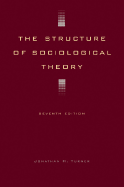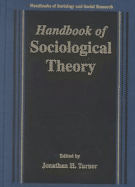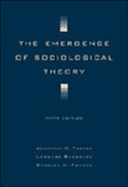|
|
|
 |
 |
|
|
Jonathan
Turner's
Major Works
Structure of Sociological Theory

About this title:
This text covers new and emerging aspects of
sociological theory and examines the significant contributions of both
modern and founding theorists. Seven sections present detailed analyses
of key theories and paradigms, including functionalism, evolutionary
theory, conflict theory, critical theory, exchange theory,
interactionist theory, and structuralism. The Seventh Edition is a less
encyclopedic text than the Sixth Edition; despite the in-depth
discussions of theorists and their contributions to the field, the text
is concise and focused and is appropriate for use in nine- and ten-week
courses.
On the Origins of Human Emotions: A
Sociological Inquiry Into the Evolution of Human Affect
 About this title:
Language and culture are often seen as unique
characteristics of human beings. In this book the author argues that
our ability to use a wide array of emotions evolved long before spoken
language and, in fact, constituted a preadaptation for the speech and
culture that developed among later hominids. Long before humans could
speak with words, they communicated through body language their
emotional dispositions; and it is the neurological wiring of the brain
for these emotional languages that represented the key evolutionary
breakthrough for our species. How did natural selection work on the
basic ape anatomy and neuroanatomy to create the hominid line? The
author suggests that what distinguished our ancestors from other apes
was the development of an increased capacity for sociality and
organization, crucial for survival on the African savanna. All apes
display a propensity for weak ties, individualism, mobility, and
autonomy that was, and is today, useful in arboreal and woodland
habitats but served them poorly when our ancestors began to move onto
the African plain during the late Miocene. The challenge for natural
selection was to enhance traits in the species that would foster the
social ties necessary for survival in the new environment. The author
suggests that the result was a development of certain areas of the
primate brain that encouraged strong emotional ties, allowing our
ancestors to build higher levels of social solidarity. Our basic
neurological wiring continues to reflect this adaptive development.
From a sociological perspective that is informed by evolutionary
biology, primatology, and neurology, the book examines the current
neurological bases of our emotionalrepertoire and their implications
for our social actions.
Handbook of Sociological Theory
About this title:
Language and culture are often seen as unique
characteristics of human beings. In this book the author argues that
our ability to use a wide array of emotions evolved long before spoken
language and, in fact, constituted a preadaptation for the speech and
culture that developed among later hominids. Long before humans could
speak with words, they communicated through body language their
emotional dispositions; and it is the neurological wiring of the brain
for these emotional languages that represented the key evolutionary
breakthrough for our species. How did natural selection work on the
basic ape anatomy and neuroanatomy to create the hominid line? The
author suggests that what distinguished our ancestors from other apes
was the development of an increased capacity for sociality and
organization, crucial for survival on the African savanna. All apes
display a propensity for weak ties, individualism, mobility, and
autonomy that was, and is today, useful in arboreal and woodland
habitats but served them poorly when our ancestors began to move onto
the African plain during the late Miocene. The challenge for natural
selection was to enhance traits in the species that would foster the
social ties necessary for survival in the new environment. The author
suggests that the result was a development of certain areas of the
primate brain that encouraged strong emotional ties, allowing our
ancestors to build higher levels of social solidarity. Our basic
neurological wiring continues to reflect this adaptive development.
From a sociological perspective that is informed by evolutionary
biology, primatology, and neurology, the book examines the current
neurological bases of our emotionalrepertoire and their implications
for our social actions.
Handbook of Sociological Theory

About this title:
This wide-ranging handbook presents in-depth
discussions on thearray of subspecialties that comprise the field of
sociologicaltheory. Prominent theorists working in a variety of
traditions discussmethodologies and strategies; the cultural turn in
sociological theorizing; interaction processes; theorizing from the
systemic andmacro level; new directions in evolutionary theorizing;
power, conflict, and change; and theorizing from assumptions of
rationality.
Sociology: Concepts and Uses
 About this title:
This is a brief, inexpensive, paperback
introduction to sociology which communicates the same amount of basic
information as larger texts. Topics covered include the history of
sociology, culture, social structure, stratification, socialization,
inequality, deviance, and social change.
Human Institutions: A Theory of Societal
Evolution
About this title:
This is a brief, inexpensive, paperback
introduction to sociology which communicates the same amount of basic
information as larger texts. Topics covered include the history of
sociology, culture, social structure, stratification, socialization,
inequality, deviance, and social change.
Human Institutions: A Theory of Societal
Evolution
 About this title:
In his newest book, leading social theorist
Jonathan H. Turner offers a creative, richly grounded reinterpretation
of social evolution.
Face to Face: Toward a Sociological Theory of
Interpersonal Behavior
About this title:
In his newest book, leading social theorist
Jonathan H. Turner offers a creative, richly grounded reinterpretation
of social evolution.
Face to Face: Toward a Sociological Theory of
Interpersonal Behavior
 Emergence of Sociological Theory
Emergence of Sociological Theory

About this title:
This scholarly text covers the first one
hundred years of sociological theorizing, from 1830-1930, focusing
primarily on Comte, Spencer, Marx, Weber, Simmel, Durkheim, Pareto, and
Mead. The text provides an in-depth examination of these early
sociological theorists with biographical background, analysis of key
works, major influences, critical insights, and also answers the
question, "What do these ideas tell us about the basic forces that
shape the social world?" Posing this question for each theorist adds a
unique perspective to the text and distinguishes it from other
sociological theory books. In addition, this edition includes material
on the enduring models and principles of the theorists' work that
continue to inform sociological theory today.
Dr.
Elwell's Home Page
©Frank Elwell
Send comments to [email protected]
.
|
|
|
|
 |
|